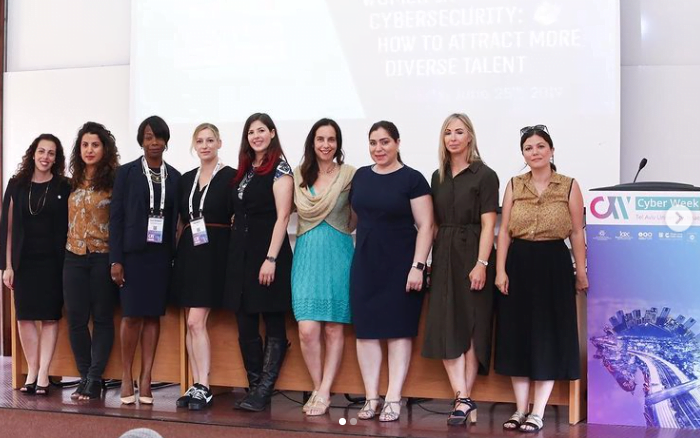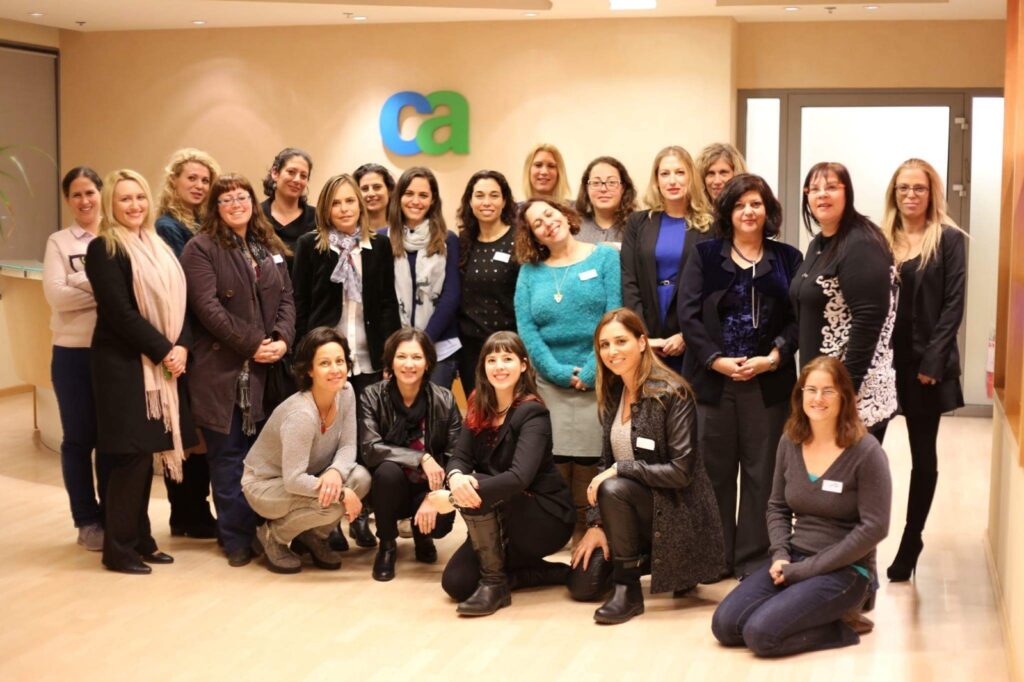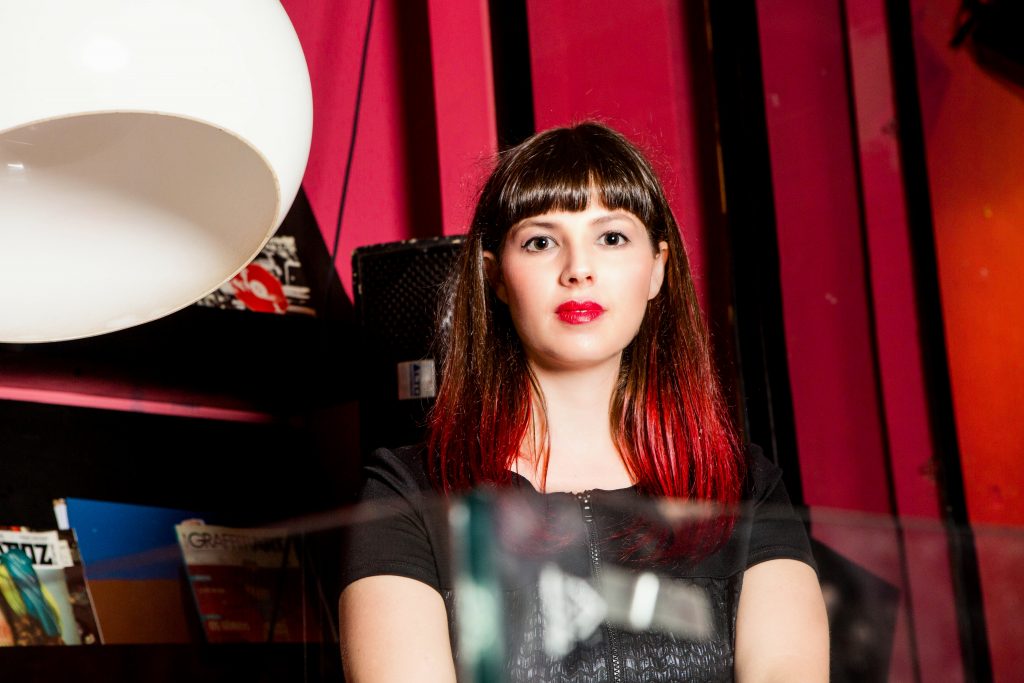Women account for 50 percent of the population, but they make up only about 28 percent of the cybersecurity industry, according to Keren Elazari, Israeli security researcher and industry analyst who tells NoCamels she has always encountered her fair share of unfavorable comments about how she was able to keep up with a male-dominated industry
“I was at a tech security conference this week and I had people coming up to me, people that are maybe half my age, questioning whether I had a computer science degree. I answered, yeah, 20 years ago, please don’t give me an exam on infinite decimal math right now, because when I was studying it, you were still in kindergarten.”
This is just one of the reasons Elazari, a noted public speaker whose popular 2014 TED talk helped shape the global conversation about the role of hackers and the evolution of cybersecurity, helped form Leading Cyber Ladies, a global movement of top women in cyber tech coming together to talk trends, network, and provide support and resource to each other in a comfortable and professional environment.

“What we’re trying to achieve with leading cyber ladies, is to really increase that impact and the visibility of women in cybersecurity, because we believe through role models, through networking, through shared experiences, we can increase the impact of women in cybersecurity and getting more women into our field and into our communities. That’s our goal. That’s our mission statement. And we started here in Israel. But we now have grown globally, and we have chapters around the world. And even today, our Israeli community is our biggest community,” says Elazari.
The network, which now has chapters in Japan, Canada, New York, and UK, began its first chapter in Tel Aviv in January 2015 with just 30 women. Today, there are around 3,000 globally, with over 1,000 in Israel. The first meetup was the idea of Hila Meller, a cybersecurity expert and executive of CA Europe at the time, who is now the Vice President for telecom giant BT Security. Meller suggested the idea to Elazari and together they set up the meeting with speakers that included El Al Airline’s chief information security officer and the leading digital crimes prosecutor in Israel, among others.

“We called ourselves the ‘Leading Cyber Ladies,’ since we want to inspire others and lead more diversity and equality in our industry,” the group’s official website says, “We felt it represented our commitment to lead for this change to happen.”
Israeli incident response and security expert Reut Menashe, who is also the founder and CEO of Tetrisponse, an incident response consultancy firm, tells NoCamels she joined Leading Cyber Ladies in 2017, to become part of an enriching community in her field and help it expand worldwide.
“I believe in the purpose. I am in information security for a number of years. I know what it’s like to be a woman in this world,” she continues, “Karen and Hila understood that there must be this community in order to empower women in cybersecurity and I joined to help and support.”
Menashe is also one of the organizers of BsidesTLV, a security research community event in Israel, taking place during Tel Aviv University’s Cyber Week.
She says the ‘Leading Cyber Ladies’ network began to expand because women in the field from around the world would come to Israel for cybersecurity or tech events and someone would invite them to come to speak at the meetings or meet the other women. Elazari and Menashe also participate in and present at many international events and will always talk up their network.

Elazari, who calls Menashe her co-pilot, is quick to different kinds of women that have become part of the group over the years. “We’ve had the cybersecurity managers of Israeli airlines. We’ve had women from Israeli banks. We’ve had women from innovative startups and founders of innovative cybersecurity startups. and omen who are leading teams of dozens if not hundreds of people,” she explains, “These are women that are already really successful, but they are constantly tested and judged. We wanted to put the emphasis on leading.”
Sign up for our free weekly newsletter
Subscribe“This week, I got a request from someone in Africa that wants to start a group,” Elazari continues, “This person heard me speak through a virtual conference in Nigeria and had the idea then and now they finally have a plan how to do it. Women are really interested in organizing and it’s easier for them when they hear there’s already a movement and a network. It’s an opportunity to be part of something.”
Becoming visible
Elazari says that based on her own experience, women in the cybersecurity industry were never as visible as they should have been for a variety of reasons. They were not connected to one another. They would not go to conferences or give talks because they were not comfortable or because they were women, they had to prove themselves five or 10 times over.
“When I first got started, more than 25 years ago, I was easily the only woman at a hacker conference or a security conference or at the meeting table or on my team at a technology company. I was really used to being the only woman around. We are proud to see it changing. There are more and more women around and in fact, the industry surveys that look at the global cybersecurity workforce here in Israel and around the world say that the numbers are getting higher and higher,” Elazari says.

Indeed, the cybersecurity community, particularly in Israel, is making greater efforts to make sure women are part of the conversation. This year’s Cybertech Global 2022 conference in Tel Aviv included a panel devoted to cyber tech women and opportunities in cybersecurity for underrepresented sectors in the industry featuring female representatives from Israeli DevOps automation software company JFrog, authorization and identity management solutions firm PlainID, AliceCode, an Israeli initiative teaching young girls how to code, and many more. Ruth Shoham, CEO of The Open University of Israel also spoke about leading women in cybersecurity.
On International Women’s Day, the Israel National Cyber Directorate sent out a list of prominent female experts in the cybersecurity industry with the intention of increasing female representation in public appearances. The list, which can be found here in Hebrew, includes names like Yuval Lazar, a senior security researcher at automated penetration testing firm Pentera, Sivan Ashkenazi, a cloud security specialist at Deloitte, and Einat Meyron, a cyber resilience specialist.
For their part, the Israeli chapter of ‘Leading Cyber Ladies’ is empowering young women with aspiring cybersecurity careers through mentorships, connecting them with other women that are already leading the field and have established themselves in the sector. The group also runs events, like Capture The Flag, a competition that Elazari says is very common in the cybersecurity world, but “you don’t see a lot of women compete.”
The Leading Cyber Ladies are also very connected to each other in the world of social media, Menashe and Elazari tell NoCamels, pointing to groups on What’s App, Facebook, LinkedIn, and Instagram. It’s a way for women in cybersecurity to connect at events, even when they don’t know each other, because they’re part of the same group, Elazari says.
Elazari also says the team in Israel works very hard to provide professional development opportunities to the community, like help for studying for specific exams, organizing product pitch events, and providing information on how to get certain certifications. “We also spend 30 percent of our time if not more supporting our global network come up with ideas for events and content,” says Menashe says, “And we are always looking for more women to join the team!” she adds.
The events aren’t even limited to women, she adds “We do invite women to our meetups, but we also invite men. Change cannot come only from women. The change depends on everyone. Obviously, if most of the companies are being managed by men then the change needs to come from them. So it’s important to understand that we are in it together. And I believe we are allies.”
Related posts

Editors’ & Readers’ Choice: 10 Favorite NoCamels Articles

Forward Facing: What Does The Future Hold For Israeli High-Tech?

Impact Innovation: Israeli Startups That Could Shape Our Future




Facebook comments